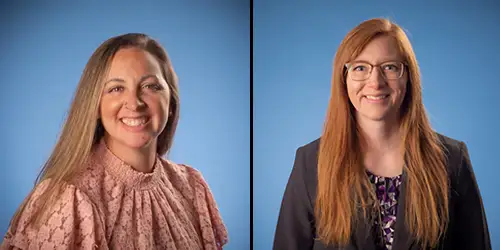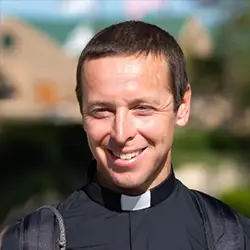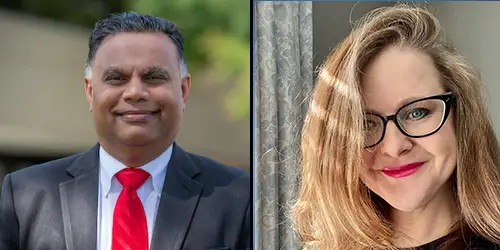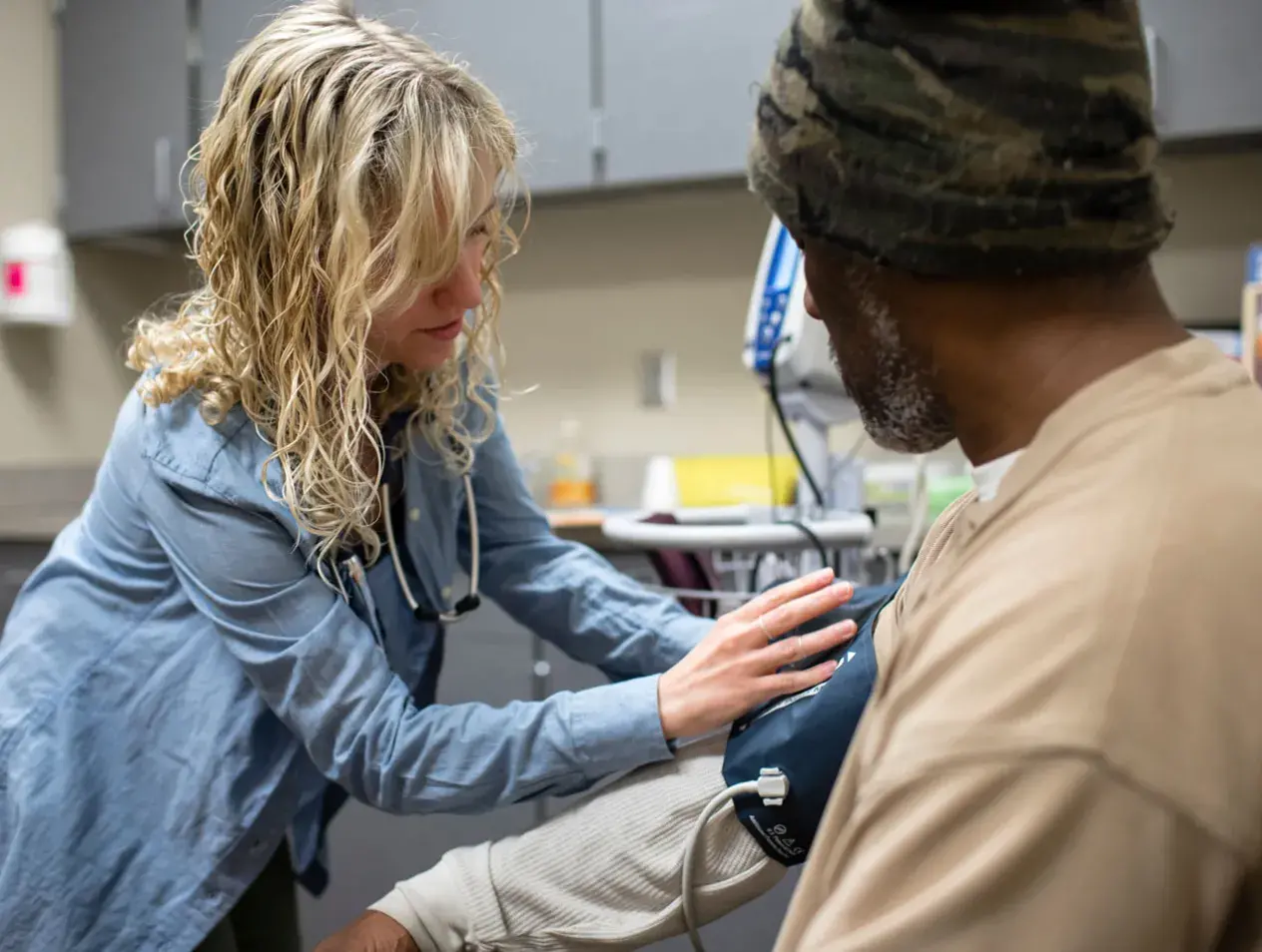
President’s Fund for Population Health
The President’s Fund for Population Health program supports faculty-led efforts to improve health and well-being of communities. Since 2024, nine projects have been funded across two cohorts, spanning Creighton’s schools and colleges in Omaha and Phoenix. Teams are guided to apply implementation science methods to their work, aiming to build towards effective, impactful and sustainable interventions.
Creighton Community Connecting Children, Youth and Families to a Hope-Filled and Housed Future at the Stephen Center
This project focused on youth and families experiencing homelessness and poverty at the Stephen Center in South Omaha. Programs addressing the needs of homeless families often focus principally on adults, leaving children at significant risk of falling behind developmentally. Yet, addressing developmental needs of children is a critical step in breaking the multigenerational cycle of homelessness. Interviews and listening sessions formed the basis of a needs assessment led by the project team, who also created a family-oriented space to promote the attainment of developmental milestones and positive mental health for children of all ages. The team oversaw students to conduct developmental assessments at the Stephen Center, leading to targeted education and therapy opportunities. The findings from this project are now informing plans for an expansion of the Stephen Center.
Project Team
- Kylie Widhelm (PI), OTD, OTR/L School of Pharmacy and Health Professions, assistant professor, occupational therapy
- Tara Eickhoff, PharmD, MBA, School of Pharmacy and Health Professions, assistant clinical professor, pharmacy practice
- Teri Corcoran, former Chief Development Officer, Stephen Center, Inc.
- Rex Younkin, Grants and Development Coordinator, Stephen Center, Inc.

Kylie Widhelm and Tara Eickhoff (l-r)
Fostering Health Equity Through a Community-Based Advanced Care Planning Clinic
Community partners have voiced concerns about the scarcity of available resources and disparities in accessing advanced care planning (ACP) support for older adults throughout Nebraska. The INTERACT project (INTERprofessional Advance Care Planning ConversaTions) addresses this public health issue through a collaborative, "whole community" approach. A team of experts from Creighton's nursing, business, law and social work programs have partnered closely with their Community Client Advisory Board on a plan to tackle barriers to end-of-life health equity through a student-led, faculty-mentored initiative. INTERACT is working to prepare faculty, students and community partners to engage in person-centered, values-based conversations about end-of-life care options to meet the needs of older adults, especially those with racial, economic and geographic disparities. The INTERACT project will launch its first pilot clinic in early 2026.
Project Team
- Jennifer Jessen (PI), EdD, RN, CNOR, College of Nursing, assistant professor, CIPER executive director
- Mandy Kirkpatrick, PhD, RN, College of Nursing, assistant professor, undergraduate nursing
- Meghan Potthoff, PhD, APRN, College of Nursing, graduate nursing, Keough Family Endowed Chair in Nursing
- Victoria Haneman, School of Law, former professor and Frank J. Kellegher Endowed Professor of Trusts & Estates
- Cathy Fox, College of Arts and Sciences, assistant professor, social work
- Ken Washer, DBA, CFA,CFPA, Heider College of Business, program director, Masters in Financial Planning and Financial Psychology, and professor of economics and finance

Jennifer Jessen
Life Together: Seeking What Makes Us Whole
Social isolation and loneliness have been identified as a national public health crisis with recognized negative impacts on individual and community health. It is a problem prevalent in the college-age population, with local data indicating that many Creighton students struggle with these issues. This project conducted a needs assessment of Creighton University undergraduate students, reaching over 1,250 students, to learn about the current prevalence of social isolation, loneliness and related issues, and to gain deeper understanding of what students are experiencing and think is needed to have a greater sense of belonging.
Project Team
- Christopher Krall, SJ, PhD (PI), College of Arts and Sciences, assistant professor, theology, and secondary appointment, neuroscience
- Kevin Fuji, PharmD, School of Pharmacy and Health Professions, associate professor, pharmacy sciences
- Mary Ann Tietjen, EdD, Student Success, The Success Center, senior director
- Katie Kelsey, EdD, Student Life, senior director, engagement and belonging
- Tricia Ross, PhD, College of Arts and Sciences, resident assistant professor, Modern Languages and Literatures and Honors Program
- Jennifer Peter, PsyD, licensed clinical psychologist and senior director, Student Counseling Services and the Violence Intervention and Prevention Center
- Theodore Dedon, PhD, College of Arts and Sciences, resident assistant professor, theology Department
- Robert Francis, Director of Campus Ministry
- Becky Nickerson, Office of the Vice Provost for Faculty and Academic Affairs, senior director, equity, diversity and inclusion
- Amy Badura Brack, PhD, College of Arts and Sciences, professor, psychological science

Christopher Krall
Meeting Patients Where They Are: A Street Psychiatry Initiative & Mental Health Needs Assessment with Omaha’s Unhoused Community
Through an in-depth needs assessment conducted with community partners and those with lived experience, this project team examined the scope of psychiatric care needs among the unhoused population in Omaha. In addition, the team piloted a rotation for street psychiatry residents and created a research-based orientation for subsequent psychiatry residents. Further, the team conducted a literature review and interviews with scholar-practitioners in the field of street medicine, and a manuscript is underway.
Project Team
- Rajesh R. Tampi (PI), MD, School of Medicine, Department of Psychiatry, professor and chair, Inaugural Bhatia Family Endowed Chair in Psychiatry
- Sara W. Bharwani, EdD, School of Medicine, Departments of Medical Humanities and Psychiatry, special assistant professor
- Phil Ryan, MD, initiated the work as a PGY-4 with the School of Medicine, Department of Psychiatry
- Coralie Eilers, MD, continued the work as aPGY-4 with the School of Medicine, Department of Psychiatry
- David Wilton, MD, continued the work as aPGY-4 with the School of Medicine, Department of Psychiatry
- Jyotsna S. Ranga, MD, School of Medicine, Department of Psychiatry, associate professor and residency training and fellowship director
- Kevin T. FitzGerald, SJ, PhD, PhD, School of Medicine, Department of Medical Humanities, chair and associate professor
- Jesse Woo, MD, PGY-2, School of Medicine, Department of Psychiatry
- Carolyn Scherf Ryan, Rapid Rehousing Program Coordinator, Heartland Family Services
- Jeff Wibel, Director of Street Outreach, Community Alliance

Rajesh Tampi and Sara Bharwani
Four Proposals Receive President’s Fund in Population Health Grants
Creighton’s Institute for Population Health (IPH) has awarded funding to four faculty-led proposals from the special President’s Fund in Population Health. Through this program, the IPH is supporting faculty from across Creighton, and their innovative projects at the intersection of healthcare and community, to measurably improve population health and health equity.
The Rev. Daniel S. Hendrickson, SJ, PhD, announced the recipients during the annual Founders Day Convocation on Feb. 4.
The grant proposals focus on health and health equity issues affecting specific populations with identified needs. The awardees will involve faculty, staff, students and community partners in both Omaha and Phoenix. The awardees will join a learning cohort, led by the IPH, which will serve as a forum for peer-to-peer learning and collaboration, sharing strategies for improving the health of these communities and providing implementation and evaluation planning support for each awardee. Through this, IPH is committed to partnering with awardees in their efforts to improve the health of all.
“The commitment of Creighton faculty to addressing complex challenges that impact health is tremendous, and it’s a privilege to support them through this grant program,” says Scott Shipman, MD, MPH, executive director of the IPH. “We are excited to begin working with the new project teams, who will add to the collective impact in population health being achieved at Creighton.”
This program seeks to build a community of faculty and staff committed to improving population health through teaching, scholarship and/or service. This year, the IPH is focused on expanding this community through the IPH Associates Program. All faculty and staff interested in population health are encouraged to learn more and join.
The 2025 newly funded projects are:
Understanding and Addressing the Needs of Youth and Families at the Stephen Center
Children and youth experiencing homelessness can suffer from chronic diseases, trauma, behavioral health problems, and education interruptions which ultimately lead to developmental delays. These family units need resources and education to help break the cycle of homelessness. Building on the insights gained and the early work implemented during the first year of the grant, this project will work to address challenges faced by children and families experiencing homelessness and poverty at the Stephen Center in South Omaha. By developing processes and programming to meet the needs of parents, case managers, and the youth, this project aims to build trust and support among families and staff to ensure the right resources are available to improve youth development.
Faculty leads are Kylie Widhelm, OTD, assistant professor of occupational therapy, and Tara Eickhoff, PharmD, assistant clinical professor of pharmacy, both in the School of Pharmacy and Health Professions.
Empowering Vulnerable and Unhoused Youth for Positive Change Through Cross-Sector Collaboration
This project aims to develop, implement, and evaluate the impact of a trauma-informed mentor program at Youth Emergency Services (YES) in Omaha, targeting homeless youth and youth survivors of sex trafficking. Recognizing the well-documented importance of supportive adult relationships in fostering resilience, and preventing exploitation, the program seeks to address the critical need for mentorship and connection with a supporting adult identified by youth at YES. The program will be developed and implemented through collaboration with researchers from Creighton University, the University of Nebraska-Lincoln, and YES staff, ensuring a youth-centered, evidence-based approach. Key objectives include recruiting and training mentors, designing tools for effective mentor-mentee matching, and evaluating the program’s impact using pre- and post-surveys that assess trust, self-value, self-harming behaviors, education/employment, future goals, self-perceived agency, and social support. The evaluation will capture both qualitative and quantitative data to comprehensively assess the outcomes.
Faculty lead is Sarbinaz Bekmuratova, PhD, associate professor of occupational therapy, School of Pharmacy and Health Professions.
AI-Enhanced Refugee Health: Smarter Solutions for Wellness
Refugees in the U.S. face significant barriers to healthcare access, health education, and chronic disease prevention, influenced by structural and systemic inequities (Rashoka et al., 2022). While refugees often arrive in better overall health than their American-born counterparts—a phenomenon known as the "healthy immigrant effect"—their health frequently declines over time due to unmet needs (Elshahat et al., 2021; Lane et al., 2018; Newbold, 2005; Su et al., 2019). Nebraska, ranked among the top 10 states for refugee resettlement per capita (DHHS, 2016; Gonzalez, 2023; Radford & Connor, 2016), has a refugee population particularly vulnerable to chronic diseases, a vulnerability further exacerbated by the COVID-19 pandemic (Tippens & Spring, 2021). This project aims to address health disparities and promote equity by designing and implementing educational interventions for refugee communities in Nebraska. These interventions will focus on nutrition education, interpreting food labels, improving health literacy, and incorporating physical activity into daily routines using wearable technology over a two-year period. Guided by Ignatian values and informed by previous work (Rashoka, 2018–2024), which included qualitative interviews with 16 healthcare providers across Nebraska (Rashoka, 2024) and need assessment based on a community advisory board, this research will target refugees receiving services from clinical sites such as CUMC, Heart Ministry, and local resettlement centers. The project will also engage nursing students (both graduate and undergraduate) and family medicine residents from Creighton University.
Faculty lead is Falah Rashoka, PhD, assistant professor, College of Nursing.
Assessing the Needs of the Unhoused Populations in Phoenix
Maricopa County is experiencing increased numbers of unhoused and underserved populations. These populations face numerous barriers to safe housing, food, and access to medical care. The Society of St. Vincent de Paul (SVdP), a close partner of Creighton University School of Medicine, is a leader in Maricopa County providing services to these marginalized communities implementing a four-pillar approach of 1) feeding the hungry, 2) clothing the vulnerable in dignity and love, 3) housing the unsheltered, and 4) providing medical and dental care. This IPH project will expand the collaboration between CUSOM and SvDP and will carry out an in-depth needs assessment of the multiple populations who utilize the resources at SvDP to better understand the local challenges and obstacles that exist for these marginalized populations.
Faculty leads are Jason Beste, MD, MPH, Rupal Vora, MD, MPH, and Moustafa Hazin, MD, School of Medicine, Health Sciences Campus – Phoenix.


